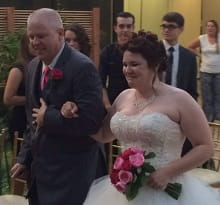Brain Surgery Live: Meet Parkinson’s Patient Greg Grindley
The world will be watching when University Hospitals Cleveland Medical Center neurosurgeons drill tiny openings in Greg Grindley’s skull and perform deep brain stimulation in an attempt to control the Parkinson’s disease that has ravaged his life. Grindley will be awake and conversing with his neurologists during the procedure.

The 49-year-old U.S. Navy veteran is hoping this sophisticated surgical procedure, being broadcast to 171 countries worldwide in a first-ever live event, allows him to resume a more normal life. "Brain Surgery Live with Mental Floss, hosted by Bryant Gumbel, premieres Oct. 25 at 9 p.m. on National Geographic Channel, and is coming to viewers live and direct from the high-tech operating suite at UH Cleveland Medical Center.
Grindley served 20 years in the Navy as an electrician, regularly using a harsh cleaning solvent now believed to have caused devastating side effects. Shortly after retiring, he experienced twitching in his right triceps and bicep. By age 40, these tremors spread and had a name: Parkinson’s disease. The Limaville, Ohio man would work only three more years before this degenerative disorder of the central nervous system stole his livelihood. It would also strip him of favorite pastimes that once included riding motorcycles, scuba diving and playing paintball with his sons.
“It’s amazing what you get used to on this roller coaster ride,” says Grindley, a father of four who walked his oldest daughter down the aisle at her wedding last month, aided by a cane and her steady arm.
Grindley had never considered surgery before. But University Hospitals neurologists, whom he met through care at the Louis Stokes Cleveland VA Medical Center, advised him that some of his tremors are caused by the medications required to control the disease. Every two hours, every day of his life, Grindley takes powerful medications that cause a range of side effects and offer only minutes of relief.
Deep brain stimulation (DBS) will help treat Grindley’s "roller coaster ride” of severe tremors and dyskinesias, the extraneous movements that can occur with medication therapy in patients with Parkinson’s disease, says his neurologist Camilla Kilbane, MD. The procedure, FDA-approved to treat essential tremor in 1997 and Parkinson’s disease in 2002, is performed only in select medical centers by a highly trained neurosurgery and neurology team.
Dr. Kilbane believes DBS can vastly improve Grindley’s quality of life, allowing him to return to the activities he enjoys, take medications less frequently, and have steady control of his symptoms throughout the day.
“I know he loves to lead an active life, and I’d like to see him get that back,” says his wife, Crystal, who will be watching the surgery with her family and friends.
Unable to work for many years, Grindley and his wife have dedicated themselves to doing good for others. They established a food pantry through their church that distributed half a million pounds of food to area families last year. The Grindleys agreed to the broadcast because they know this procedure can instill hope in others if it succeeds in controlling his tremors. "If one person realizes they can change their life, it will be worth it,” Grindley says.


